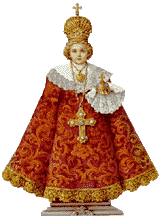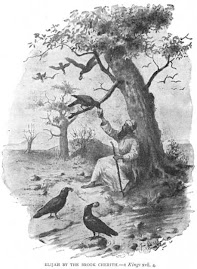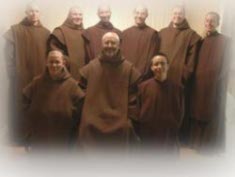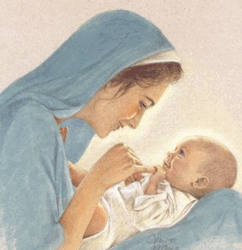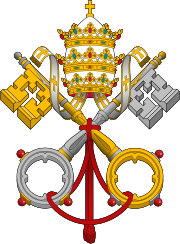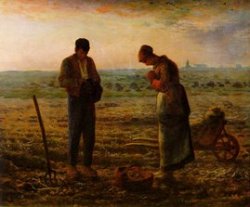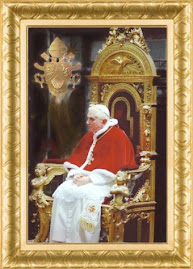 MATER CASTISSIMA, ORA PRO NOBIS
MATER CASTISSIMA, ORA PRO NOBIS
Hope of earth and joy of Heaven,Love and praise to thee be given!
Behold, thou art fair, My beloved and comely. (Cant. 1:15)
Thou art the glory of Jerusalem....for thou hast done manfully, and thy heart has been strengthened because thou hast loved chastity....Therefore also the hand of the Lord hath strengthened thee, and therefore thou shalt be blessed for ever (Judith 15:10,11).
"How beautiful art Thou, My love; how beautiful art thou! Thy eyes are doves' eyes, besides what is hid within" (Cant. 4). "How beautiful is the chaste generation with glory!" (Wisd 4). "Thou art fair, O my love, thou art fair" (Cant). We can imagine the divine Infant Jesus addressing His holy Mother in such words as the above, as He lay on her lap, and she ministered to Him as her Child. Or if He did not think well to break His self-imposed silence, similar thoughts would be in His heart as He contemplated the work of His hands, and saw that it was good. How it would console Him, too, to think of the "chaste generation" that would follow the example given them by Mary! True, His spotless one was but one; there would never be her equal; still, He knew the virtue of chastity would henceforth be on a very different footing from what it had hitherto been. "Thou art the glory of Jerusalem" would he think as He watched her humbly setting about her household duties. "Thou art the joy of Israel, thou art the honour of our people, for thou hast done manfully, and thy heart hast been strengthened because thou hast loved chastity."
 There was nothing soft or weak about Mary's virtue. She was the valiant woman, par excellence, who defeated and set at naught the machinations of Satan and his crew. She was strong of heart in consequence, and so able later to bear heavier sufferings than have ever yet, or ever will, fall to the lot of mortal. We read of Judith that she wore hair-cloth and fasted almost daily; and it is recorded of our Lady that she, too, though the perfection of innocence, practised great bodily austerities (Husenbeth's Life of the B. Virgin). What must we think of our own cowardice in this respect? But humility, far more than austerity, was the support of Mary's virtue. Her simply, unaffected lowliness baffled all the wiles of the devil. Her childlike rejoicing in the gifts God bestowed on her, as being all His and showing forth His generosity and goodness, her self-forgetfulness (for humility is the effacement of self), her love of poverty and the hidden life - all these kept spotless the glittering whitness of her soul. "Therefore also the hand of God hath strengthened thee", "He hath given His angels charge over thee to keep thee in all thy ways". How lovingly must these blessed spirits have watched over and guarded the Virgin Mother of God from her conception to her assumption! With what admiration they must have regarded this chief d'oeuvre of their Creator whom He had made expressly for Himself! As St Bernard so beautifully puts it: "It became God to be born of none but of a virgin. It became a virgin mother to be the Mother of God. It became the Creator of mankind to choose unto Himself such a mother as He knew beseemed Him, and would please Him. He was pleased, therefore, that she should be a virgin, of whom, being herself stainless, He should be born stainless, to purge away all stains. He was pleased that she should be lowly, out of whom He should come forth, who is meek and lowly of heart, to set an example unto all, in Himself, of needful and helpful graces. He granted her the power of motherhood while yet a maiden, having already Himself breathed into her the love of virginity, and granted unto her the reward of her lowliness. And that she, who was to bear and conceive the Holy of Holies, might be holy in body, she received the gift of virginity and of lowliness. "O Virgin most wonderful and most worshipful, O woman worthy of a worship all thine own, thou that renewest them that were before thee, quickenest them that come after thee. 'The Angel was sent unto a Virgin' - a virgin in body, a virgin in mind, a virgin by profession, a virgin such as the apostle would have her be: 'Holy, both in body and in spirit," - a virgin not newly found, nor by hazard, but elect from everlasting, foreknown by the Most High, and made ready by Him, foreshadowed by Patriarchs, and foretold by Prophets."
There was nothing soft or weak about Mary's virtue. She was the valiant woman, par excellence, who defeated and set at naught the machinations of Satan and his crew. She was strong of heart in consequence, and so able later to bear heavier sufferings than have ever yet, or ever will, fall to the lot of mortal. We read of Judith that she wore hair-cloth and fasted almost daily; and it is recorded of our Lady that she, too, though the perfection of innocence, practised great bodily austerities (Husenbeth's Life of the B. Virgin). What must we think of our own cowardice in this respect? But humility, far more than austerity, was the support of Mary's virtue. Her simply, unaffected lowliness baffled all the wiles of the devil. Her childlike rejoicing in the gifts God bestowed on her, as being all His and showing forth His generosity and goodness, her self-forgetfulness (for humility is the effacement of self), her love of poverty and the hidden life - all these kept spotless the glittering whitness of her soul. "Therefore also the hand of God hath strengthened thee", "He hath given His angels charge over thee to keep thee in all thy ways". How lovingly must these blessed spirits have watched over and guarded the Virgin Mother of God from her conception to her assumption! With what admiration they must have regarded this chief d'oeuvre of their Creator whom He had made expressly for Himself! As St Bernard so beautifully puts it: "It became God to be born of none but of a virgin. It became a virgin mother to be the Mother of God. It became the Creator of mankind to choose unto Himself such a mother as He knew beseemed Him, and would please Him. He was pleased, therefore, that she should be a virgin, of whom, being herself stainless, He should be born stainless, to purge away all stains. He was pleased that she should be lowly, out of whom He should come forth, who is meek and lowly of heart, to set an example unto all, in Himself, of needful and helpful graces. He granted her the power of motherhood while yet a maiden, having already Himself breathed into her the love of virginity, and granted unto her the reward of her lowliness. And that she, who was to bear and conceive the Holy of Holies, might be holy in body, she received the gift of virginity and of lowliness. "O Virgin most wonderful and most worshipful, O woman worthy of a worship all thine own, thou that renewest them that were before thee, quickenest them that come after thee. 'The Angel was sent unto a Virgin' - a virgin in body, a virgin in mind, a virgin by profession, a virgin such as the apostle would have her be: 'Holy, both in body and in spirit," - a virgin not newly found, nor by hazard, but elect from everlasting, foreknown by the Most High, and made ready by Him, foreshadowed by Patriarchs, and foretold by Prophets."MOTHER MOST CHASTE, PRAY FOR US
credits: first picture is a beautiful Madonna painted by Sandro Boticelli whereas the second picture is an example of 18th century engraving by the renowned Augsburg artist, Josef Sebastian Klauber. The picture is baroque illustration of Mary depicted as exalted Mother, Virgin, and Queen. The illustration is very rich spiritually and the artist highlights Our Lady's chastity, by surrounding her image with two biblical symbols of virginity, hortus conclusus (enclosed garden) and fons signatus (sealed fountain). Both symbols came from the Song of Songs, "You are. . .my sister, my bride, an enclosed garden, a fountain sealed" (Canticle 4, 12). That is why we can see here a typical half-image of Mother and child that form the crown of a tree which bears simultaneously, flowers and fruit. They are symbols of Mary's role as virgin (flower) and mother (fruit)- "What a beautiful and chaste creature" (Wisdom 4) (info and picture credit to: Litany of Loreto).
To pay homage due to Our Lady's virtue of chastity this beautiful meditation (taken form "My Mother and My Queen book) was posted today accompanied by two pictures combining exceptional beauty of Boticelli's painting and spiritually rich symbolism of popular religious art that can be found nowadays only in old religious books.
